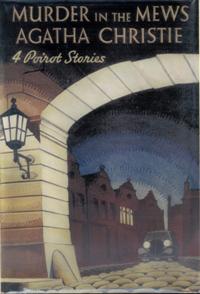The Incredible Theft

Dust-jacket illustration of the first UK edition
|
|
| Author | Agatha Christie |
|---|---|
| Cover artist | Robin Macartney |
| Country | United Kingdom |
| Language | English |
| Genre | Detective fiction Short stories |
| Publisher | Collins Crime Club |
|
Publication date
|
15 March 1937 |
| Media type | Print (hardback & paperback) |
| Pages | 288 pp (first edition, hardback) |
| Preceded by | Cards on the Table |
| Followed by | Dumb Witness |
Murder in the Mews and Other Stories is a short story collection written by Agatha Christie and first published in the UK by Collins Crime Club on 15 March 1937 In the US, the book was published by Dodd, Mead and Company under the title Dead Man's Mirror in June 1937 with one story missing (The Incredible Theft); the 1987 Berkeley Books edition of the same title has all four stories. All of the tales feature Hercule Poirot. The UK edition retailed at seven shillings and sixpence (7/6) and the first US edition at $2.00.
Japp asks Poirot to join him at a house in Bardsley Garden Mews where a Mrs Barbara Allen shot herself the previous evening – Guy Fawkes Night – the moment of death being disguised by the noise of fireworks. Once there they find that the doctor thinks there is something strange about the death of the fine lady, a young widow. Mrs Allen was found by a housemate, Miss Jane Plenderleith, who had been away in the country the previous night. The victim was locked in her room and was shot through the head with an automatic, the weapon being found in her hand. The doctor however points out that the gun is in her right hand while the wound is above the left ear – an impossible position to shoot with the right hand. It looks as if this is a murder made to look like suicide – and by an unusually incompetent murderer with a very low estimation of the intelligence of police investigators. They interview Miss Plenderleith and find out that Mrs Allen was engaged to be married to Charles Laverton-West, an up-and-coming young MP but, although the pistol was the dead lady's, she cannot think of a reason why she should use it to commit suicide.
Japp and Poirot find further clues: the gun has been wiped clean of fingerprints and large sums of money have been withdrawn from Mrs Allen's bank account on several occasions but there is no trace of money in the house. They also learn from a neighbour that Mrs Allen had a gentleman caller the previous evening whose description doesn't tally with that of her fiancé. Feeling that Miss Plenderleith is keeping something back, they ask her about this male visitor and she suggest that it was Major Eustace – a man that Mrs Allen had known in India and whom she has seen on several occasions in the past year. She got the feeling that Mrs Allen was afraid of the man and Japp and Poirot suggest that Major Eustace was blackmailing her – an idea which meets with approval from Miss Plenderleith. Poirot points out though that it is unusual for blackmailers to kill their victims, normally it is the opposite way round. Japp, as part of his look round the house, searches a cupboard under the stairs which contains items such as umbrellas, walking sticks, tennis racquets, a set of golf clubs and a small attaché-case which Miss Plenderleith hurriedly claims is hers. The two men sense Miss Plenderleith's heightened tension.
...
Wikipedia
